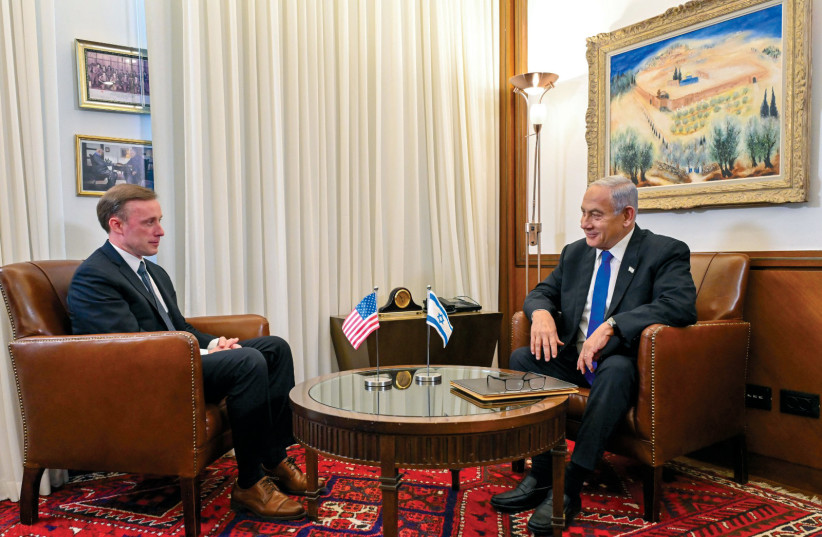Israel and the United States agreed to tighten their security coordination against Iran after a group of top officials from both countries met in Washington on Monday.
“Officials pledged to enhance coordination on measures to prevent Iran from acquiring a nuclear weapon and to further deter Iran’s hostile regional activities,” the White House said after the meeting US-Israel Strategic Consultative Group.
As part of that gathering, US National Security Adviser Jake Sullivan hosted Israeli National Security Advisor Tzachi Hanegbi and Strategic Affairs Minister Ron Dermer, along with a senior Israeli interagency delegation. They were joined by senior US representatives from their respective foreign policy, defense, and intelligence agencies, the White House stated.
They met as the International Atomic Energy Agency board meeting of the 35 nations including the United States, gathered in Vienna to consider whether to take action against Iran for enriching uranium at 84%, which is close to the 90% needed for weapons-grade production.
“The officials reviewed with significant concern advances in Iran’s nuclear program, and affirmed their mutual objective of further enhancing the longstanding security partnership between Israel and the United States,” the White House explained.

They also reviewed recent joint military exercises between the US military and the Israel Defense Forces,US Secretary of Defense Lloyd Austin visit to Israel that is due to begin on Wednesday.
Austin is expected to discuss both Iran and the escalating West Bank violence, with a focus on the potential for an even larger outbreak during the month of Ramadan which begins on March 22.
US Secretary of State Antony Blinken raised both topics when he meet with Hanegbi and Dermer.
US State Department spokesman Ned Price said that Blinken expressed his concern about the violence in Israel and the West Bank and “emphasized the need for all parties to take steps to restore calm and de-escalate tensions.”
Prime Minister Benjamin Netanyahu’s Office and the White House, however, did not raise the topic of the West Bank in their public comments about the meetings.
Hanegbi forces on the joint US-Israeli military excursive and said it reflected “the unique contribution of the steadfast alliance between the two countries to regional security,” according to PMO.
Hanegbi said “the success of the joint military exercise reflects the unique contribution of the steadfast alliance between the two countries to regional security,” according to Prime Minister Benjamin Netanyahu’s Office.
The White House said, the officials reviewed efforts to further deepen Israel’s security and political integration into the Middle East region through the Abraham Accords, the Negev Forum, and other formats such as I2U2 – a forum that includes Israel, India, the US and the UAE.
Sullivan “reemphasized President Biden’s unshakeable commitment to Israel’s security as expressed in the Jerusalem US-Israel Strategic Partnership Joint Declaration signed during the President’s visit to Israel in July 2022,” the White House said
The 2015 Joint Comprehensive Plan of Action
Israel and the US have increased their cooperation against Iran, as the Biden administration has halted its efforts to revive the 2015 Joint Comprehensive Plan of Action designed to curb Iran’s nuclear program.
The former Trump administration withdrew from the deal in 2018. US President Joe Biden had initially sought to revive the deal but took it off the table last year. Israel’s public opposition to that plan had long created a wedge between Jerusalem and Washington, that has since been bridged.
In advance of the IAEA board meeting this week, the organization’s director-general Rafael Grossi travels to Iran. Upon his return on Saturday, he said he had secured an agreement that Iran had agreed to re-install all extra monitoring equipment, such as surveillance cameras, at nuclear sites. Progress, he said, was also made on various issues, including a long-stalled IAEA inquiry into uranium particles found at three undeclared sites in Iran.
The ability of the IAEA to monitor Iran’s nuclear program is one of the basic requirements for the resumption of the JCPOA, a deal that Grossi still supports.
In Washington on Monday, US State Department spokesman Ned Price clarified that the United States, one of the signatories to the deal, does not believe it can be revived at this time.
“The JCPOA is not on the agenda; it has not been on the agenda for some time,” Price said.
“What has been on the agenda,” he said, is the Iranian suppression of its own people, its provision of armed drones to Russia and its wrongful detention of Americans.
He welcomed the agreement Grossi reached with Iran, stating that the US expected Iran to follow through on that agreement and allow for monitoring of its nuclear facilities.
“Too many times in the past we’ve seen Iran issue vague promises, only never to follow through,” Price said.
“We and the IAEA Board of Governors have been clear that Iran must cooperate with the IAEA fully and without delay,” he added.
Senator Bob Menendez (D-NJ) Chairman of the Senate Foreign Relations Committee, called on the IAEA to approve a resolution censuring Iran. “As the Iranian regime continues to push the limit and enrich nuclear material to record levels approaching the 90 percent threshold for a nuclear weapon, the international community must respond,” said Menendez. “The regime’s excuses that these steps were accidental ring hollow and the international community must treat these for what they were: intentional,” he continued. “Likewise, Tehran’s agreement this weekend to increase IAEA monitoring at nuclear facilities falls well short of addressing these provocative steps.”
Reuters contributed to this report.
